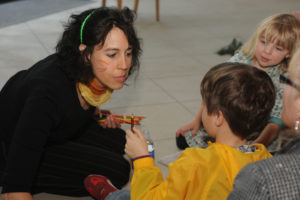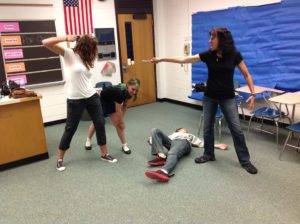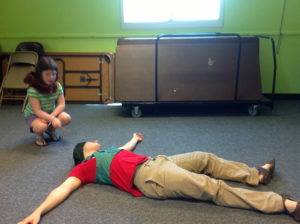I get a lot of questions from non-theatre people about how to teach theatre to kids. And I love it! It might be from a camp counselor who wants to put together a skit for the parents or a history teacher trying to get students to understand the choices of the Ancient Romans. Regardless, I have a few tricks that I always like to pass on to educators undertaking this endeavor.

What background do I need as an educator?
Know first that it will be difficult, similar to running a science camp without a strong background in science. Don’t make the mistake of thinking that anyone can do it cause it’s just reciting a few lines. Go in humbly and with an open mind.
For starters, always remember to include creative exercises that let students break out of their comfort zone and then recenter themselves with breathing exercises and the like.
Performance games like “Lemonade” and “Lean and Leave” are perfect for this, and there are many many resources with terrific suggestions.
How do I get students to learn their lines?
But what about working on the script? Here are some helpful ideas to help the kids learn their lines without running drills.
1) Keep it fun, fast, and furious. Find goals that are NOT “learn your lines” but rather focus on the flow of IDEAS. Remember — the lines themselves are not important — the kids just need to know what comes next. There are a few fun ways to do this. Try doing the scenes backwards or playing a game of freeze tag but add that saying their line is how they are safe.
2) Occasionally, as in the case of a joke, the lines ARE important. To get them to memorize this, have a joke session! Before lunch, everyone has to think of their favorite jokes in real life and tell one after lunch. Then, do a TREASURE HUNT for jokes in the script. Have them find places where a few words could be changed to ADD A JOKE. This will help to make your play funny AND your students will be learning the whole script without realizing it.
 3) Focus on having a team do the background for each scene. They could be the things such as a table or a slide. They could also be background actors like cafe goers. Believe it or not, this will actually help your actors learn their lines as they’re getting into the scene.
3) Focus on having a team do the background for each scene. They could be the things such as a table or a slide. They could also be background actors like cafe goers. Believe it or not, this will actually help your actors learn their lines as they’re getting into the scene.
4) Find the kid (there are always a few) who know the whole play. Figure out a way for them to help out with a question when another kid is stuck. For example, if my line is “I’d like a pickle” and I forget, you might say to me, “Don’t you want something sour to go with that sandwich?”






